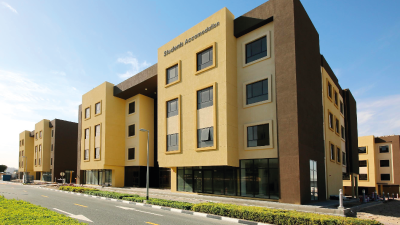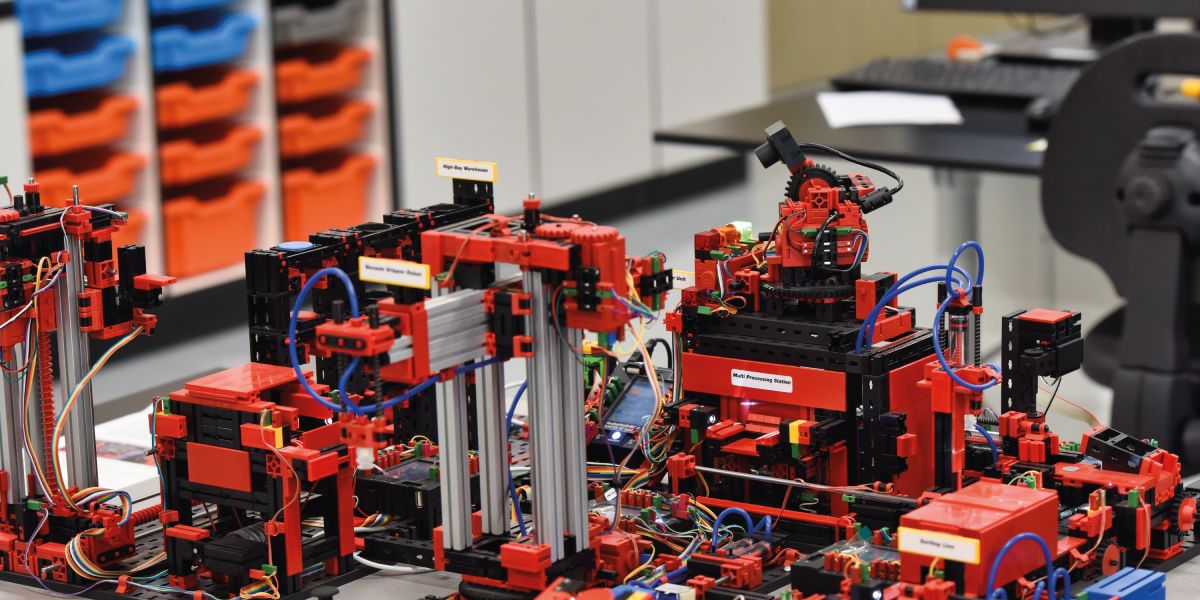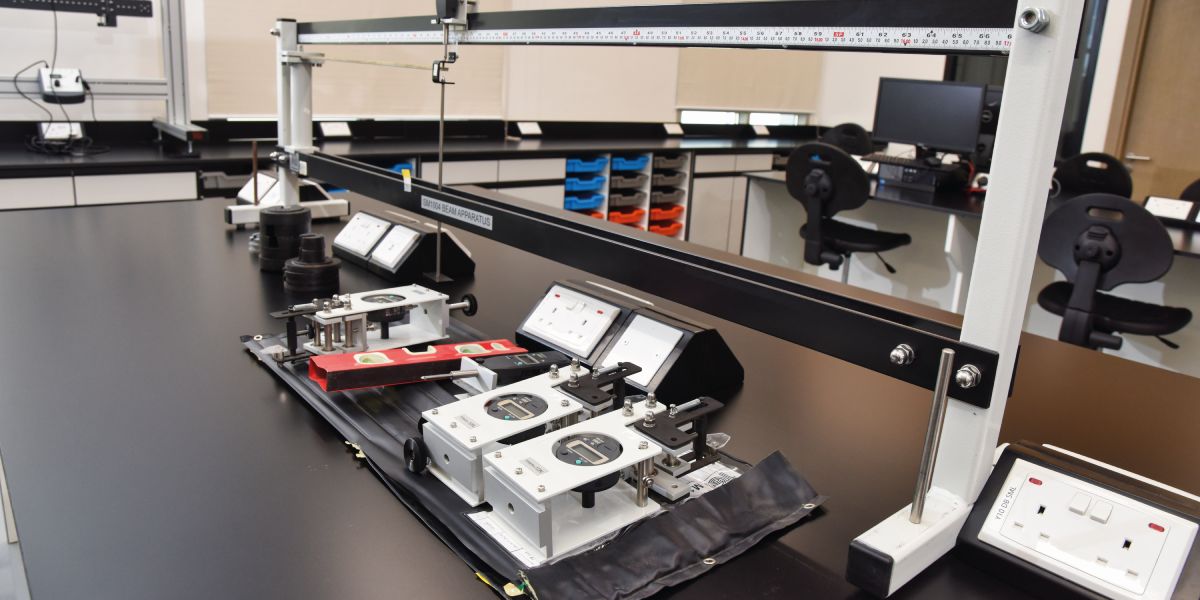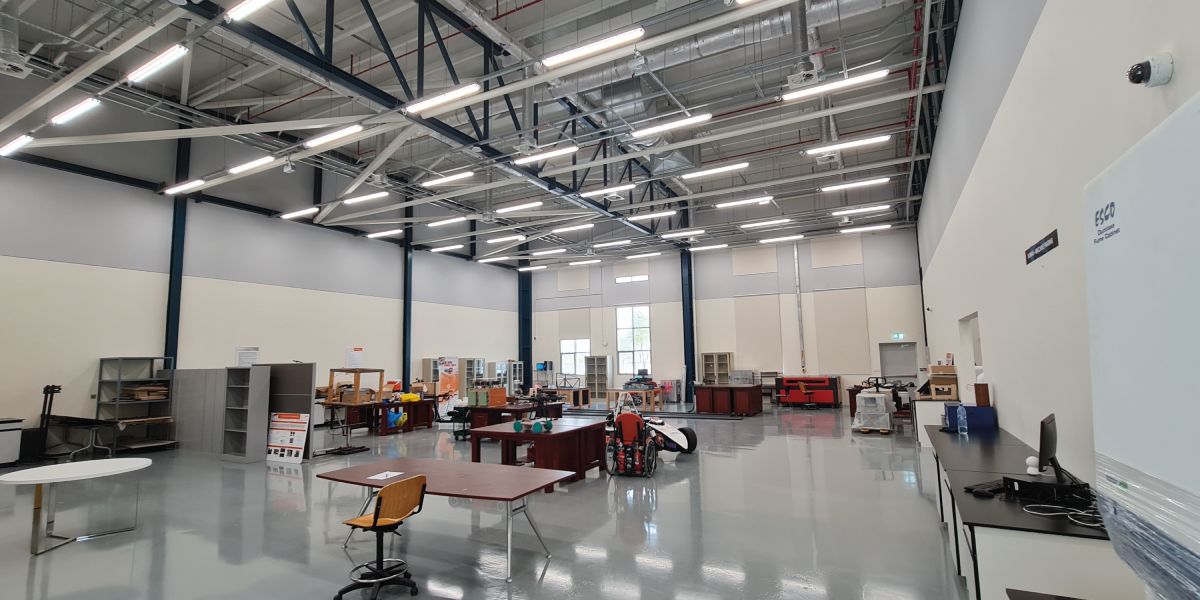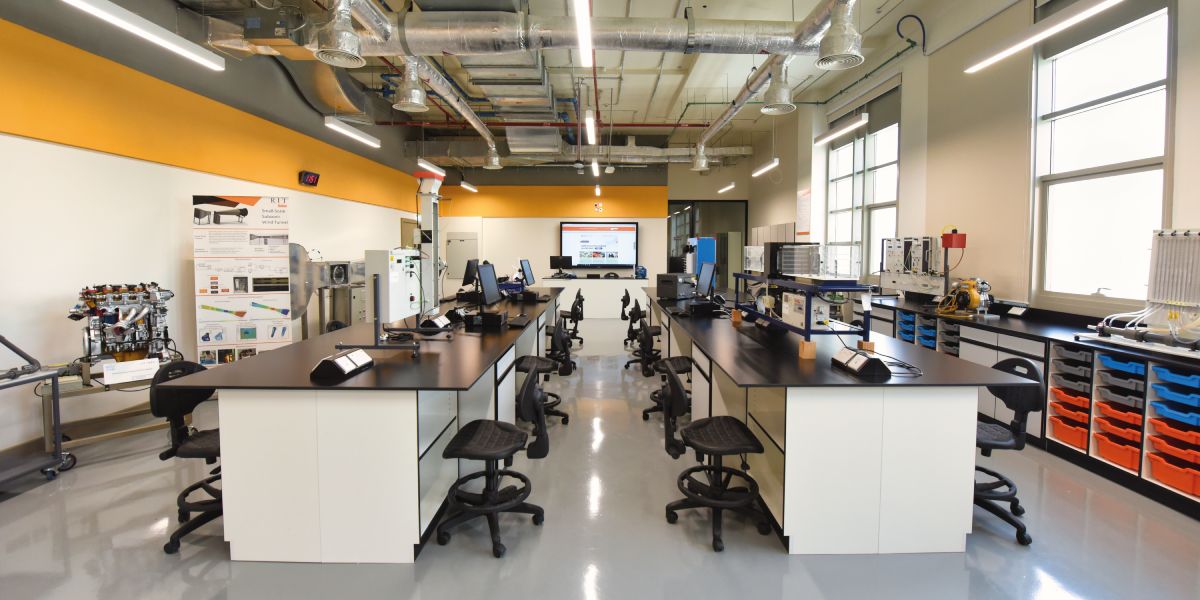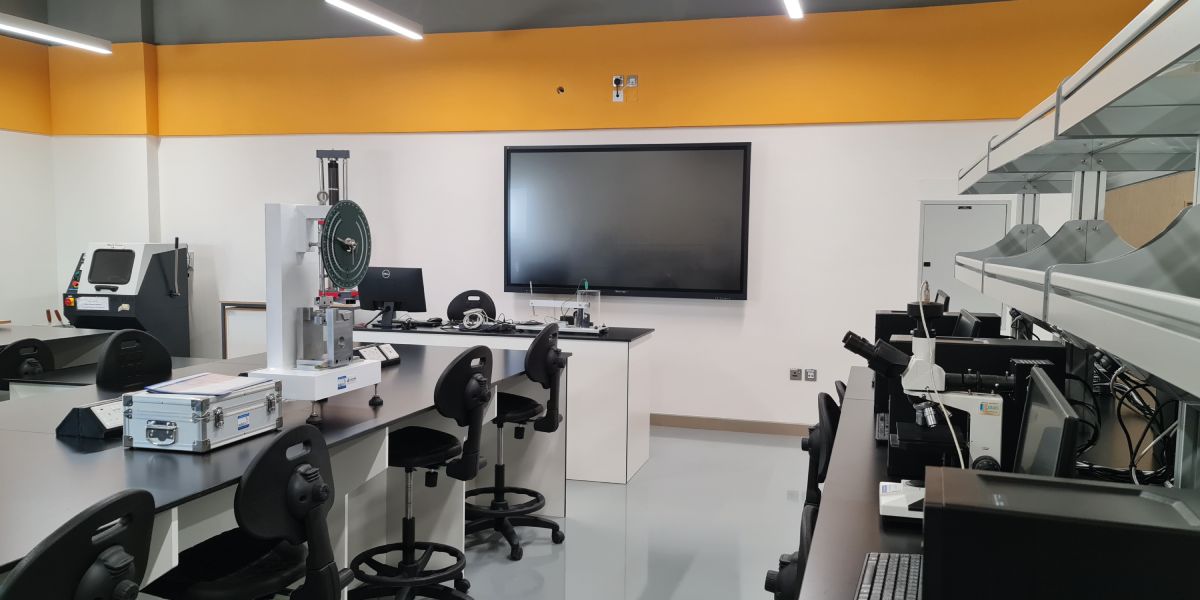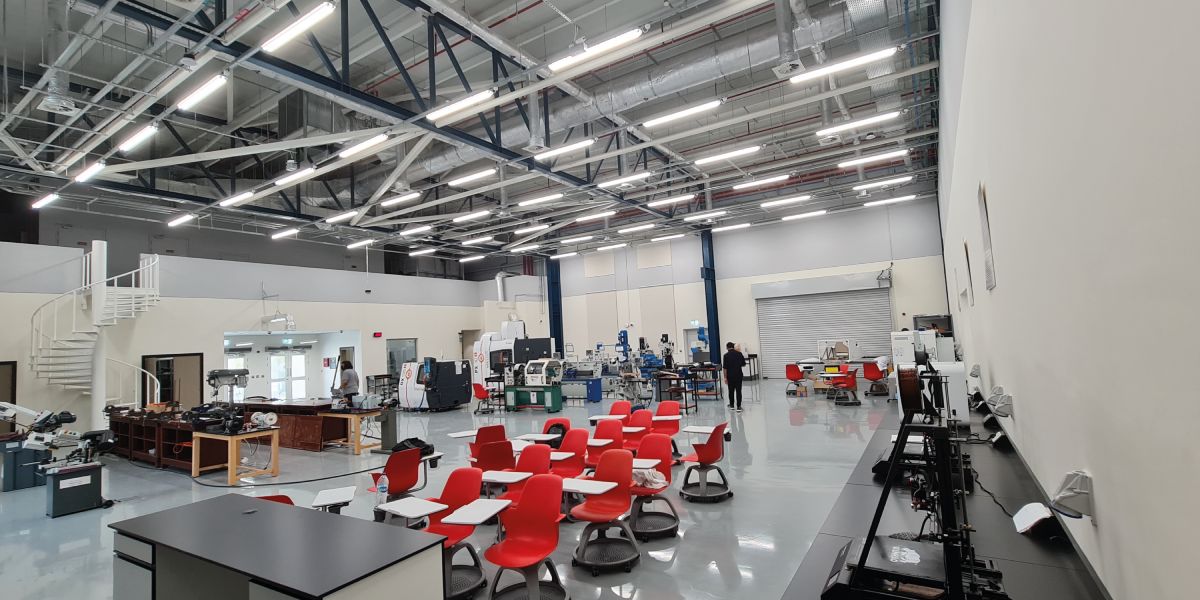Master of Science in Mechanical Engineering
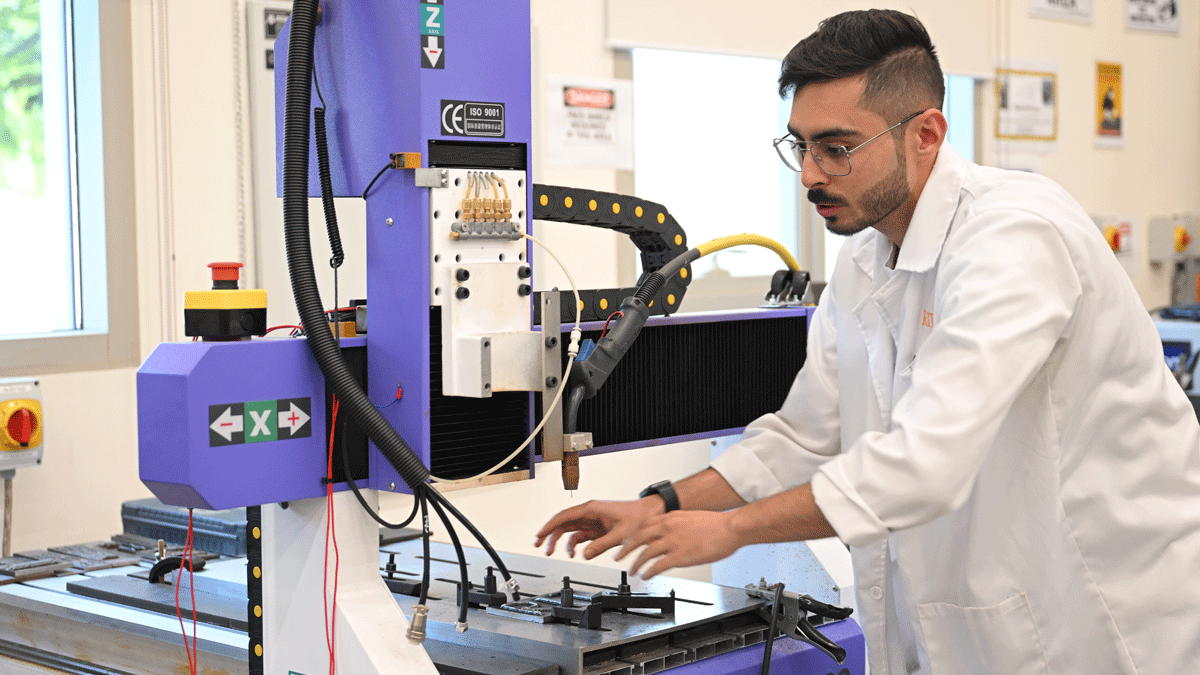
Mechanical Engineering
Master of Science Degree
- RIT/
- RIT Dubai/
- Academics and Learning/
- Graduate Degrees/
- Masters of Science in Mechanical Engineering
Accredited by the UAE Ministry of Education
A mechanical engineering master's degree that focuses on the in-depth examination of dynamics, robotics, nanotechnology, biomechanics, and energy systems to prepare you to enter a career in industry or research.
Overview
The Master of Science in Mechanical Engineering is a 30-credit hour degree program. The program allocates twenty-four credit hours of course work, distributed in core, focus area and elective groups, and six credit hours of thesis work. Three focus areas, specializations, are offered at RIT Dubai: Sustainability, Thermo/Fluids Engineering and Mechanics & Design. Special curriculum may be designed to fulfil the needs of certain individuals with proper approvals from the main campus. The program follows evening classes model to better serve the working engineers who strive to further their expertise.
Typical Job Titles
| Research and Development Engineer | Mechanical Engineer |
| Software Engineer | FEA Engineer |
| Packaging Engineer | Thermal Engineer |
Mission Statement
The mechanical engineering masters produces graduates who are leaders in their respective fields who are ready to tackle high-level problems as practicing professionals. Designed for students who desire advanced training in specific areas of mechanical engineering, the master of science acts as a prelude to a career in either research or industry. Students can choose to focus on a variety of disciplines including sustainability, mechanics & design or thermo-fluids engineering. The program has been designed to develop innovative approaches to solve different kinds of mechanical engineering problems. The graduates from the program learn and gain knowledge and skills required for a wide range of engineering career challenges and practice. Furthermore, collaborative environment is created while educating the students to perform novel research as well as embrace creativity, interdisciplinary thought, critical thinking and social liability. It also prepares the candidates to successfully pursue graduate degrees at the doctoral levels.
Program Educational Objectives
The Mechanical Engineering Program Educational Objectives (PEO) are broad statements that describe what graduates are expected to attain within a few years of graduation. Program educational objectives are based on the needs of the program’s constituencies.
The Mechanical Engineering faculty, in conjunction with its constituents, has established the following program educational objectives:
- PEO 1: Practice mechanical engineering in support of the design of engineered systems through the application of the fundamental knowledge, skills, and tools of mechanical engineering.
- PEO 2: Enhance their skills through formal education and training, independent inquiry, and professional development.
- PEO 3: Work independently as well as collaboratively with others, while demonstrating the professional and ethical responsibilities of the engineering profession.
- PEO 4: Successfully pursue graduate degrees at the doctoral levels, should they choose.
Program Learning Outcomes
- Demonstrate a depth of knowledge of mechanical engineering.
- Complete an independent research project, resulting in at least a thesis publication.
- Demonstrate knowledge of contemporary issues in their chosen field of research.
- Demonstrate an ability to defend their research work to a panel of experts.
Curriculum
Typical Course Sequence
Total Credit Hours - 30
| Course | Sem. Cr. Hrs. | |
|---|---|---|
| MECE-707 |
Engineering Analysis
This course trains students to utilize mathematical techniques from an engineering perspective, and provides essential background for success in graduate level studies. An intensive review of linear and nonlinear ordinary differential equations and Laplace transforms is provided. Laplace transform methods are extended to boundary-value problems and applications to control theory are discussed. Problem solving efficiency is stressed, and to this end, the utility of various available techniques are contrasted. The frequency response of ordinary differential equations is discussed extensively. Applications of linear algebra are examined, including the use of eigenvalue analysis in the solution of linear systems and in multivariate optimization. An introduction to Fourier analysis is also provided.
|
3 |
| MECE-709 |
Advanced Engineering Mathematics
Advanced Engineering Mathematics provides the foundations for complex functions, vector calculus and advanced linear algebra and its applications in analyzing and solving a variety of mechanical engineering problems especially in the areas of mechanics, continuum mechanics, fluid dynamics, heat transfer, and vibrations. Topics include: vector algebra, vector calculus, functions of complex variables, ordinary differential equations and local stability, advanced matrix algebra, and partial differential equations. Mechanical engineering applications will be discussed throughout the course.
|
3 |
| MECE-795 |
Graduate Seminar
This seminar course presents topics of contemporary interest to graduate students enrolled in the program. Presentations include off campus speakers, and assistance with progressing on your research. Selected students and faculty may make presentations on current research under way in the department. All graduate students enrolled full time (whether dual degree or single degree) are required to attend a designated number of seminars.
|
0 |
| MECE-790 |
Thesis
Prior to completing 24 semester credit hours of graduate work, students should prepare and present a formal thesis proposal to their faculty advisor. An acceptable proposal (including a statement of work, extensive literature search, and proposed timeline), signed by the student and approved by their faculty advisor and department head, is required prior to registering for thesis credits. Students must form a graduate thesis committee in coordination with their advisor and present their proposal to their committee for review and approval during the first semester in which they have registered for thesis credit. Students are required to deliver a successful written and oral presentation of their thesis.
|
6 |
| Graduate Focus Area Courses | 9 | |
| Graduate electives | 9 | |
Focus Areas
Please note that the availability of courses & options within the graduate program curriculum is subject to student enrollment numbers.
Sustainability (Choose 3 of the following)
| Course | Sem. Cr. Hrs. | |
|---|---|---|
| MECE-629 |
Renewable Energy Systems
This course provides an overview of renewable energy system design. Energy resource assessment, system components, and feasibility analysis will be covered. Possible topics to be covered include photovoltaics, wind turbines, solar thermal, hydropower, biomass, and geothermal. Students will be responsible for a final design project.
|
3 |
| MECE-733 |
Sustainable Energy Management
This course, Sustainable Energy Management, provides an overview of mechanical systems within energy intensive applications such as power plants, automobiles, and buildings with an emphasis on advanced thermodynamic analyses of sub-systems which possess the most visible energy signature in terms of energy usage, energy inefficiency, thermoeconomic costing, and exergy destruction. Fundamentals of system operation are explored as well as various sustainability measures. In addition, the interrelationship between energy intensive applications and public policy instruments and strategies are examined. Students will explore methods by which engineers evaluate energy-intensive systems to assess alignment with sustainability and communicate findings to inform the public policy process cycle.
|
3 |
| MECE-739 |
Alternative Fuels and Energy Efficiency
This course provides an overview of the potential alternative fuels and energy efficiency technologies for powering current and future vehicles. Alternative fuel production technologies and utilization of fuels such as biodiesel, ethanol, and hydrogen will be covered. The primary technical and environmental issues associated with these alternative fuels will be discussed. Approaches to improving vehicle efficiency will also be explored. Students will be responsible for a final design or research project.
|
3 |
| ISEE-786 |
Lifecycle Assessment
This course introduces students to the challenges posed when trying to determine the total lifecycle impacts associated with a product or a process design. Various costing models and their inherent assumptions will be reviewed and critiqued. The inability of traditional costing models to account for important environmental and social externalities will be highlighted. The Lifecycle Assessment approach for quantifying environmental and social externalities will be reviewed and specific LCA techniques (Streamlined Lifecycle Assessment, SimaPro) will be covered.
|
3 |
| MECE-689 | Special Topics: Air Conditioning in Hot and Humid Conditions | 3 |
| MECE-689 | Special Topics: Fundamentals of Sustainable Engineering | 3 |
| MECE-789 | Special Topics: Design of Thermal Systems | 3 |
Mechanics and Design (Choose 3 of the following)
| Course | Sem. Cr. Hrs. | |
|---|---|---|
| MECE-605 |
Finite Elements
This course focuses upon theoretical and applied concepts pertaining to the finite element method. Direct and weighted residual formulation methods are derived and applied to problems in the area of structural analysis, fluid flow, and heat transfer. Foundational topics include shape functions, element formulation, element assembly, boundary conditions, matrix solution methods, mesh refinement, and convergence. The use of a standard commercial finite element software package is introduced.
|
3 |
| MECE-623 |
Powertrain Systems and Design
This course will introduce the analysis and design of power transmission systems. Topics covered include power transmission shafts: spur, helical, bevel, and worm gears drives; planetary gear systems; belt and chain drives. Students will use this foundation to complete a design project for a powertrain system that will contain detailed calculations of its different components.
|
3 |
| MECE-644 |
Introduction To Composite Materials
This course is an introductory course to the fundamentals and applications of composite materials. Topics covered include constituents of composite materials, fabrication techniques, micromechanical analysis, macromechanical analysis, and the use of composites in design. Some laboratory work is to be performed, and a design project is required.
|
3 |
| MECE-638 | Design of Machine Systems | 3 |
| MECE-670 | Manufacturing Processes and Engineering | 3 |
Thermo-Fluids Engineering
| Course | Sem. Cr. Hrs. | |
|---|---|---|
| MECE-731 |
Computational Fluid Dynamics
This course covers the basics of introduction to Computational Fluid Dynamics (CFD) n fluid mechanics and heat transfer. CFD methods of flow modeling are introduced with emphasis of in-class use of CFD software for modeling and problem solution. Course work involves tutorials and design examples. This course also introduces the students to some of the commercial CFD codes being used for solving thermal-fluid problems. Students complete an individual CFD study project including a written report and a presentation of the results.
|
3 |
| MECE-738 |
Ideal Flows
This course covers the fundamental topics in the theory of aerodynamics and high speed flows. The course discusses modern aerodynamic applications in the areas of wing and airfoil design, wind tunnel testing and compressible flows.
|
3 |
| MECE-751 |
Convective Phenomena
This course introduces the student to the flow of real incompressible fluids beginning with a review of ideal flows. The differential approach is used to develop and solve the equations governing the phenomena of mass, momentum, and heat transfer. The material in the course provides the necessary background for a study of computational fluid dynamics. Students should be familiar with concepts of ideal flows. MECE-738 is recommended.
|
3 |
To graduate, students need to complete all the requirements as listed in the curriculum graduation policy
Advisory Board Members
|
Mr. Faisal Al Kamali |
Mr. Mohamed Ibrahim |
|
Mr. Musa Faisal |
Mr. Sarfraz Dairkee |
|
Mr. Bassel Anbari |
Mr. Ahmed Warsame |
|
Mr. Main Canaan |
Mr. Omar Ghazal |
|
Mr. Mohamad Abou Laban |
Dr. Ahmed Alaa Eldin |






